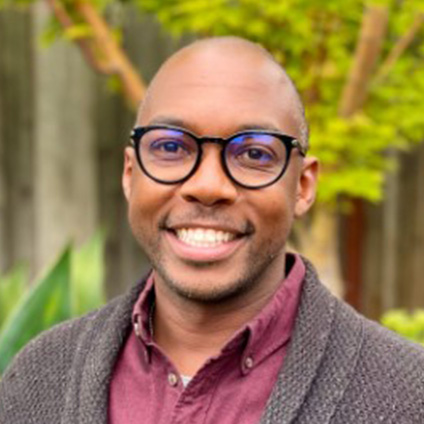Chadwick Campbell
2024 URH Faculty Mentor Award Recipient

Please tell us a bit about your educational background and current research.
I am originally from Baton Rouge, LA and started my educational journey as a major in Engineering and then Business. I moved to the SF Bay Area in 2002, and after volunteering and eventually becoming staff at the Stop AIDS Project, one of the first HIV prevention organizations in the 1980s. I fell in love with the work and saw that there were a number of social and structural influences on HIV risk and the lives of the people we served. That was my inspiration to complete my undergraduate education in Sociology at San Francisco State. I subsequently earned my Master of Public Health from SF State and my PhD in Medical Sociology at UC San Francisco. I primarily conduct qualitative research focused on exploring the socio-structural factors that contribute to disparities in HIV diagnoses and care and treatment outcomes among gay and bisexual men and other historically and contemporary marginalized communities.
Did you do research as an undergraduate student? How did you get started in your current field?
I was already working in research before I returned to school to complete my undergraduate studies. Working in HIV prevention in San Francisco, I had the opportunity to work as a research assistant on a small CDC-funded project, and subsequently, I worked on a large NIH funded project prior to completing my bachelor’s degree. I worked in research throughout my undergraduate, masters, and doctoral training. All of that work was in socio-behavioral HIV research and was the foundation for the research I do today.
Who are some of your most memorable mentors? How did you meet them?
I have had amazing mentors throughout my career. There are three, in particular, who have been incredibly supportive of me at every stage. I met each of them when I applied for jobs and they hired me to work on research studies with them. They each gave me opportunities to write manuscripts, get additional training, present at conferences and two ultimately served on my dissertation committee. At this stage in my career, I still look to them for advice and guidance as I navigate my role as a faculty member.
Why do you enjoy being a mentor?
I know how important my mentors have been to my success. They taught me how to do research, how to engage community, and how to write manuscripts and grants. It is part of my personal mission to do the same for other young scholars. I love being in the classroom, and learning theory and key skills and practices in public health is essential. But when a student tells me that they have an interest in research or they are trying to figure out the next step in their educational journey, I relish the opportunity to do whatever I can to help them along the way. Mentorship allows me to help them to connect what they learn in their classes to real world public health challenges, and to gain skills and experience that will be valuable to their careers.
What is the most useful piece of advice a mentor gave you?
This is a hard one! I think the one I value the most is to stay true to who I am and what I value. For example, when I was younger, I had a hard time saying no when an opportunity presented itself. Taking opportunities when they come is not a bad thing. However, the advice was that some opportunities may not help me to achieve my goals or may not be focused on topics that relate to what I am passionate about. I always share this with mentees as well. Consider every opportunity but be thoughtful about how they align with your goals and your own interests before saying yes.